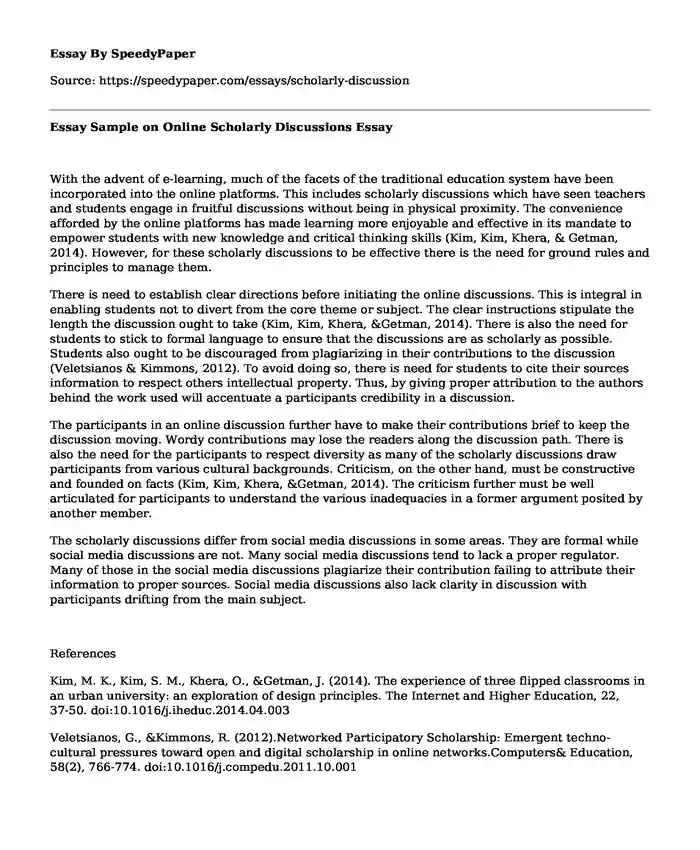With the advent of e-learning, much of the facets of the traditional education system have been incorporated into the online platforms. This includes scholarly discussions which have seen teachers and students engage in fruitful discussions without being in physical proximity. The convenience afforded by the online platforms has made learning more enjoyable and effective in its mandate to empower students with new knowledge and critical thinking skills (Kim, Kim, Khera, & Getman, 2014). However, for these scholarly discussions to be effective there is the need for ground rules and principles to manage them.
There is need to establish clear directions before initiating the online discussions. This is integral in enabling students not to divert from the core theme or subject. The clear instructions stipulate the length the discussion ought to take (Kim, Kim, Khera, &Getman, 2014). There is also the need for students to stick to formal language to ensure that the discussions are as scholarly as possible. Students also ought to be discouraged from plagiarizing in their contributions to the discussion (Veletsianos & Kimmons, 2012). To avoid doing so, there is need for students to cite their sources information to respect others intellectual property. Thus, by giving proper attribution to the authors behind the work used will accentuate a participants credibility in a discussion.
The participants in an online discussion further have to make their contributions brief to keep the discussion moving. Wordy contributions may lose the readers along the discussion path. There is also the need for the participants to respect diversity as many of the scholarly discussions draw participants from various cultural backgrounds. Criticism, on the other hand, must be constructive and founded on facts (Kim, Kim, Khera, &Getman, 2014). The criticism further must be well articulated for participants to understand the various inadequacies in a former argument posited by another member.
The scholarly discussions differ from social media discussions in some areas. They are formal while social media discussions are not. Many social media discussions tend to lack a proper regulator. Many of those in the social media discussions plagiarize their contribution failing to attribute their information to proper sources. Social media discussions also lack clarity in discussion with participants drifting from the main subject.
References
Kim, M. K., Kim, S. M., Khera, O., &Getman, J. (2014). The experience of three flipped classrooms in an urban university: an exploration of design principles. The Internet and Higher Education, 22, 37-50. doi:10.1016/j.iheduc.2014.04.003
Veletsianos, G., &Kimmons, R. (2012).Networked Participatory Scholarship: Emergent techno-cultural pressures toward open and digital scholarship in online networks.Computers& Education, 58(2), 766-774. doi:10.1016/j.compedu.2011.10.001
Cite this page
Essay Sample on Online Scholarly Discussions. (2019, Sep 11). Retrieved from https://speedypaper.net/essays/scholarly-discussion
Request Removal
If you are the original author of this essay and no longer wish to have it published on the SpeedyPaper website, please click below to request its removal:
- Personal Essay Example: My Biggest Mistake
- Museum Industry Essay Sample
- The Liberal Tantrums: A Book Review of "The Once and Future Liberal" by Mark Lilla
- Pathophysiology of CVI and DVT
- Andreas Ekstrom: The Moral Bias
- Essay Sample on Post-Hip Fracture Rehabilitation for Patients at Home
- Question 1: The figure, author, time of existence and sources of information
Popular categories





